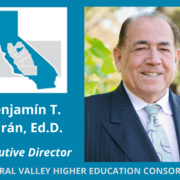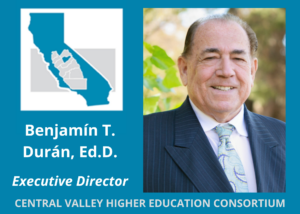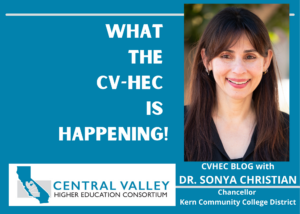 The role of higher education in the Central Valley is increasingly recognized by our state’s elected officials and the public at large. So it carries a particular significance that on Feb. 23, the California Community College Board of Governors appointed Dr. Sonya Christian, chancellor of the Kern Community College District, as the incoming chancellor of the state’s community college system. Dr. Christian is a proven champion of the under-represented populations served by the community colleges in the San Joaquin Valley. For this month’s “What The CV-HEC Is Happening” blog, CVHEC’s Executive Director Benjamin Duran connected with Dr. Christian to capture her thoughts about her work in the Central Valley, and the California Community College system as a whole, before she formally steps into her new role this June.
The role of higher education in the Central Valley is increasingly recognized by our state’s elected officials and the public at large. So it carries a particular significance that on Feb. 23, the California Community College Board of Governors appointed Dr. Sonya Christian, chancellor of the Kern Community College District, as the incoming chancellor of the state’s community college system. Dr. Christian is a proven champion of the under-represented populations served by the community colleges in the San Joaquin Valley. For this month’s “What The CV-HEC Is Happening” blog, CVHEC’s Executive Director Benjamin Duran connected with Dr. Christian to capture her thoughts about her work in the Central Valley, and the California Community College system as a whole, before she formally steps into her new role this June.
Higher Ed in the Central Valley
A look at a tenure of accomplishments by KCCD Chancellor chosen to lead the CCC System – Part 1
 Benjamin Duran: Thank you, Sonya, for taking the time to speak with us here at CVHEC, and congratulations again on your appointment to the state Chancellor’s office. We are elated to have an administrator from the Central Valley representing higher education in such an important office. What are your thoughts on the work being done in the valley, and how that ongoing work will inform your work statewide?
Benjamin Duran: Thank you, Sonya, for taking the time to speak with us here at CVHEC, and congratulations again on your appointment to the state Chancellor’s office. We are elated to have an administrator from the Central Valley representing higher education in such an important office. What are your thoughts on the work being done in the valley, and how that ongoing work will inform your work statewide?
 Sonya Christian: Thank you for inviting me, Ben. My focus will be to continue to advance student success and student access with equity … without distractions. This has been my work as president of Bakersfield College (BC), as chancellor of the Kern Community College District (Kern CCD), and it will continue to be my focus as the statewide chancellor.
Sonya Christian: Thank you for inviting me, Ben. My focus will be to continue to advance student success and student access with equity … without distractions. This has been my work as president of Bakersfield College (BC), as chancellor of the Kern Community College District (Kern CCD), and it will continue to be my focus as the statewide chancellor.
The critical challenges we face in the Central Valley are emblematic of the challenges and opportunities we face in California – e.g. the enrollment decline during the pandemic and the basic needs of our students. The challenges are magnified in the Central Valley’s populations with higher levels of poverty, lower educational attainment levels, larger proportions of first-generation college students… and I believe the work we have been doing and will continue to do in the Central Valley should serve as a model for advancing student success with equity in the rest of the state.
Let me take a moment to brag about the innovation that has happened in the Central Valley, and acknowledge the leadership role that CVHEC has had in this work.
Dual Enrollment and Early College
I see Dual Enrollment and Early College as being essential. High school students need to know that they are on the path to college and can succeed on that path. This is all the more important for our first-gen students.
 I believe that all our work should be supported by the data. Let me share with you some of the data for the Dual Enrollment/Early College sections in the Central Valley.
I believe that all our work should be supported by the data. Let me share with you some of the data for the Dual Enrollment/Early College sections in the Central Valley.
- Total special admit enrollments increased by 25% in 2021-2022; from 74,629 enrollments in 2020-2021 to 93,248 enrollments 2021-2022 (CA state growth was 5%)
- 21% (93,248 out of 441,691) of all special admit enrollments in California in 2021-2022 were from the Central Valley Region
- 5 out of the 9 high schools that received the CDE’s California Dual Enrollment Exemplary Award were from the Central Valley Region
-
- Arvin High School- Bakersfield College
- Delano High School- Bakersfield College & Cerro Coso Community College
- Robert F. Kennedy High School- Bakersfield College & Cerro Coso Community College
- McFarland High School- Bakersfield College
- Avenal High School- West Hills College, Coalinga
Transfer
The Central Valley has done remarkable work supporting the detailed institutional clarification and creation of transfer pathways, including the implementation of Program Pathways Mapper. E.g., about two years after UC Merced, Merced College and Bakersfield College began collaborating on clarifying transfer pathways as part of a Learning Lab grant, enrolling transfer students took a big jump relative to the overall UC system. In fall 2021 they enrolled 19% more transfers, and in fall 2022 it was 14% more.
In all, UC Merced has published 27 vetted transfer pathways with Merced College and another 29 with Bakersfield College. UC Merced has also been engaging all Central Valley community colleges in linking their program maps to UC Merced to establish a network of transfer pathways for the region.
CSU Bakersfield has also been a leader in transfer pathways mapping with 39 transfer program maps currently linked to Bakersfield College programs.
And CSU Stanislaus has just begun onboarding onto the Program Pathways Mapper, adding more transfer momentum to the region’s guided pathways efforts.
Workforce Development
 The 15 colleges in the Central Valley/Mother Lode (CVML) Regional Consortium have been advancing equity and access for students in many areas:
The 15 colleges in the Central Valley/Mother Lode (CVML) Regional Consortium have been advancing equity and access for students in many areas:
- Increased the number of students who earned a degree, certificate, or apprenticeship by 5%
- Decreased the average number of units accumulated by First-Time Associate Degree Earners by 4%
- Developed over 120 programs in high-priority industry sectors to address skills gaps in the workforce
Here are some examples of great work from our colleges:
- Fresno City College and its sister institutions, Clovis, Madera, and Reedley, are pioneering an apprenticeship program called the California Tribal Environmental and Cultural Equitable Vocational Training to close equity gaps for indigenous residents in two programs: Environmental Science and Protection Technician and Cultural Protection Technician/Monitor. This project is a collaboration with the California Tribal Emergency Response and Relief Agency (CTUAC) and the California Tribal Unilateral Apprenticeship Committee (CTUAC). The purpose of the project is to recruit 25 apprentices from tribal communities.
- Bakersfield College hosted the first CVML Apprenticeship Forum in December 2022 to provide best practice strategies in meeting Governor Newsom’s equity goal of having 500,000 apprenticeships by 2029. Additionally, it received the California Apprenticeship Initiative: New & Innovative grant to develop apprenticeship programs in Information and Communication Technology as well as Perioperative Nursing for underrepresented students.
- West Hills College Lemoore is leading a regional project called Jumpstart for rising seniors to learn about Industrial Automation and gain work experience in an accelerated summer bridge program with Reedley College, College of the Sequoias, and Porterville College.
- Recently, 9 of the CVML colleges (Columbia, Fresno, Bakersfield, Cerro Coso, West Hills College Lemoore, Madera, Merced, San Joaquin Delta, Modesto, College of the Sequoias, Porterville, and Taft) received the second largest award for the Regional Equity and Recovery Partnership (RERP) grant, a partnership among the Labor and Workforce Development Agency (LWDA), the California Workforce Development Board (CWDB), and the California Community College Regional Consortia via the California Community College Chancellor’s Office. These colleges are coordinating a regional effort to improve job quality and access for women and underrepresented populations to help meet economic, social, and environmental needs of the community.
- Bakersfield College, Fresno City College, Merced College, Modesto College, San Joaquin Delta College and West Hills College Coalinga are part of the Rising Scholars Network, a CCCCO DEI initiative, that serves justice-involved and formerly involved students earn certificates and degrees to either transfer or to attain a mid- to high-wage job.
- Fresno City College and Modesto Junior College are two of 14 California community colleges participating in the 3-year College Homeless Housing Insecure Pilot Program to address the 19% of unhoused students.
These selected initiatives make visible the scope of committed work in the Central Valley to support access with equity, and success with equity.

Ben: Whoa, that is a lot of data! I guess that is what you get when you have a conversation with a former math faculty. Now, Early College and Dual Enrollment has a lot of potential in the Central Valley, and Kern CCD has been one of the leaders in that space for several years. How has your work in this area as President of Bakersfield College and Chancellor of Kern CCD prepared you for this new role?
 Sonya: It has been the greatest pleasure of my career to be able to give back to the district where I started in higher education as a math instructor. I came to USC as a foreign graduate student and was first hired as a math faculty at BC. The President at that time, Rick Wright, and the Chancellor Jim Young, sponsored me for my green card. And now I am a citizen of this amazing country.
Sonya: It has been the greatest pleasure of my career to be able to give back to the district where I started in higher education as a math instructor. I came to USC as a foreign graduate student and was first hired as a math faculty at BC. The President at that time, Rick Wright, and the Chancellor Jim Young, sponsored me for my green card. And now I am a citizen of this amazing country.
The 25,000 sq miles of Kern’s Service area includes rural communities with lower economic and educational attainment levels, and includes a range of strong industries like agriculture, energy, defense and aerospace, healthcare and logistics. The work done by the three colleges in the Kern district – Porterville College, Cerro Coso College, and Bakersfield College – has focused on advancing equity in access to a college education, equity in completing a degree or certificate, and equity in placement in good jobs. Various initiatives that were started as innovative projects have been institutionalized and are now a part of how we do our work.
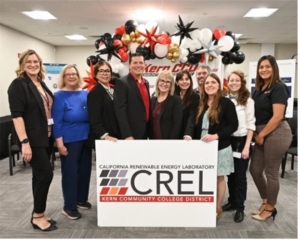
The Early College efforts started with our rural communities of McFarland, Delano, Wasco, Shafter and Arvin/Lamont. Kern has also see
n rapid growth in our health care programs and we are working closely with industry and community-based organizations to move our energy-
related work.
With the Governor’s ambitious climate agenda, I see community colleges as providing the necessary infrastructure and engagement for all of our communities, offering educational attainment with equity, and creating economic mobility with equity. Kern has established a satellite presence of the National Renewable Energy Laboratory called the California Renewable Energy Laboratory (CREL).
And I have to mention the deep work that Kern has done using the Guided Pathways framework, work that has resulted in significant improvements in student success outcomes with equity.
This work was done to meet the needs of students of the colleges of the Kern Community College District (KernCCD)and the Central Valley. But of course the fundamental needs are in common to students at colleges across the state. In that regard meeting the needs of the populations we serve at the Kern CCD and the Central Valley has prepared me well for the work ahead.
 Ben: Throughout your career as an administrator, you’ve demonstrated a forward-thinking, outside-the-box approach. What are some of your other big priorities as you step into your new role as state chancellor this June?
Ben: Throughout your career as an administrator, you’ve demonstrated a forward-thinking, outside-the-box approach. What are some of your other big priorities as you step into your new role as state chancellor this June?

Sonya: At the February 23rd, Board of Governors meeting where I was appointed, I made the following comment:
The Board of Governors is tasking the 11th Chancellor of the California Community Colleges to be both implementer and visionary, all at once, to further advance the next frontier of student success with equity. Our work then is twofold: (1) Implement the Vision for Success with equity, fidelity, at scale, using the identified metrics, and (2) expand the canopy of community college learners , to accelerate the socio-economic mobility for our most marginalized communities through partnerships that will reach working adults, disconnected youth and others left behind.
Let me call out a few specific pieces of work:
One of my first priorities will be to work alongside the Cal State and UC systems to improve intersegmental transfer from the community colleges into four-year institutions. We’ve talked previously about implementing the Vision for Success and the Governor’s Roadmap with equity and at scale, and that includes the community college transfer students moving to a four-year university and completing their bachelor’s degree.
Workforce Development has been on the top of my mind the last few years. Systematically providing opportunities for working adults, disconnected youth and other learners who previously have been bypassed, is the next wave of our Guided Pathways work. Our work today is creating the future of learning where there are many more flexible onramps to educational pathways that lead to quality jobs.
The Governor’s Roadmap calls out four priority sectors – healthcare, climate action, education and early education. Community colleges – together with our partners – must lead the way to meet these goals.
At Kern, I have been working on the Climate Action agenda specifically in the areas of Carbon Capture and Sequestration, Clean Transportation, and Grid Resilience. I believe that Community Colleges are essential in advancing the state and federal goals for decarbonization and climate action, and it will be especially important to support the clean energy transition in the Central Valley.
Last and certainly not least, supporting our students with their basic needs by providing customized support for the diverse students we serve. This includes the work we have started with mental health support, affordable student housing and the Cal Grant Reform.
 Ben: Sonya, I am glad you mentioned transfer. You know that CVHEC has identified this as a priority and has done great work on transfer pathways. How do you see this playing out at the state level?
Ben: Sonya, I am glad you mentioned transfer. You know that CVHEC has identified this as a priority and has done great work on transfer pathways. How do you see this playing out at the state level?
 Sonya: Increasing baccalaureate attainment has always been a priority for me, ever since I started as President of BC. Many of the underserved rural communities in Kern’s service have low educational attainment levels – this is why we launched, with urgency, the Rural Initiative as an equity imperative to advance educational attainment levels with the goal of advancing the socio-economic standing of these communities. In this work, we specifically focused on: (i) increasing baccalaureate completion by creating transfer pathways from high schools through the community college to a four-year university as well as (ii) bringing bachelor’s degrees closer to home by developing local Community College Baccalaureate programs that lead to high-wage jobs.
Sonya: Increasing baccalaureate attainment has always been a priority for me, ever since I started as President of BC. Many of the underserved rural communities in Kern’s service have low educational attainment levels – this is why we launched, with urgency, the Rural Initiative as an equity imperative to advance educational attainment levels with the goal of advancing the socio-economic standing of these communities. In this work, we specifically focused on: (i) increasing baccalaureate completion by creating transfer pathways from high schools through the community college to a four-year university as well as (ii) bringing bachelor’s degrees closer to home by developing local Community College Baccalaureate programs that lead to high-wage jobs.
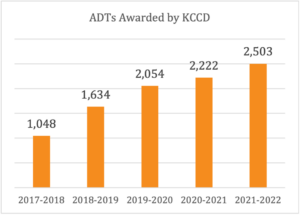
The transfer legislation SB 1440 and the creation of the Associate Degree for Transfer (ADT) helped Kern increase completion rates of the transfer degree. The graph shows the number of ADTs awarded at Kern increased from just over 1,000 five years ago in 2017-2018 to just over 2,500 in 2021-22; that is an increase of 146%.
And for California Community Colleges as a whole, the five-year increase from 36,101 ADTs conferred in 2016-17 to 62,934 in 2020-21 represents a 74% increase.
As more and more students complete the ADT, we need to ensure that the number of applications to our transfer institutions is increasing, as well. This will be a priority for me as I transition to my new role.
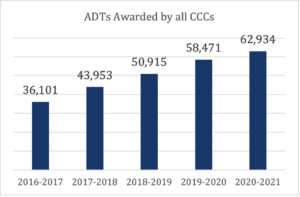 The Community College Baccalaureate is important to me. I remember the excitement that rippled through California’s Community Colleges in 2015 when SB 805 passed that launched the 15-college baccalaureate pilot program. And later in 2021 with AB 927 institutionalizing the pilot. In the Central Valley, Bakersfield College is providing high-wage, workforce-focused baccalaureate degrees and has two baccalaureate degree programs: Industrial Automation and Research Laboratory Technician. Also, Modesto Junior College offers a Respiratory Care B.S. degree, and other Central Valley colleges are developing baccalaureate degree programs. The Community College Baccalaureate will be a priority as I transition to my new role.
The Community College Baccalaureate is important to me. I remember the excitement that rippled through California’s Community Colleges in 2015 when SB 805 passed that launched the 15-college baccalaureate pilot program. And later in 2021 with AB 927 institutionalizing the pilot. In the Central Valley, Bakersfield College is providing high-wage, workforce-focused baccalaureate degrees and has two baccalaureate degree programs: Industrial Automation and Research Laboratory Technician. Also, Modesto Junior College offers a Respiratory Care B.S. degree, and other Central Valley colleges are developing baccalaureate degree programs. The Community College Baccalaureate will be a priority as I transition to my new role.
 Ben: As always, it looks like you have an ambitious agenda, and I’m excited to see how the community colleges evolve to support students with equity under your leadership. The Central Valley stands ready to support you in your new role. Thank you again for speaking with us. I know you’ll continue to make the Central Valley proud!
Ben: As always, it looks like you have an ambitious agenda, and I’m excited to see how the community colleges evolve to support students with equity under your leadership. The Central Valley stands ready to support you in your new role. Thank you again for speaking with us. I know you’ll continue to make the Central Valley proud!

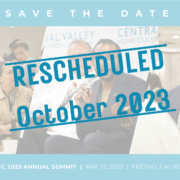
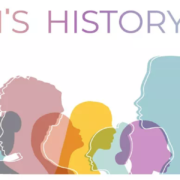
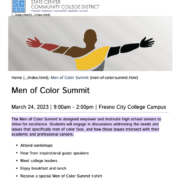
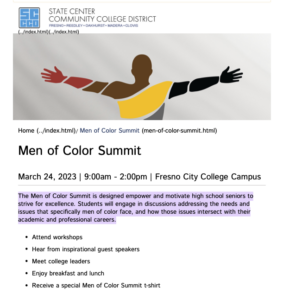

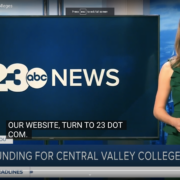

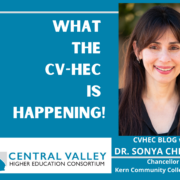







 The Community College Baccalaureate is important to me. I remember the excitement that rippled through California’s Community Colleges in 2015 when SB 805 passed that launched the 15-college baccalaureate pilot program. And later in 2021 with AB 927 institutionalizing the pilot. In the Central Valley, Bakersfield College is providing high-wage, workforce-focused baccalaureate degrees and has two baccalaureate degree programs: Industrial Automation and Research Laboratory Technician. Also, Modesto Junior College offers a Respiratory Care B.S. degree, and other Central Valley colleges are developing baccalaureate degree programs. The Community College Baccalaureate will be a priority as I transition to my new role.
The Community College Baccalaureate is important to me. I remember the excitement that rippled through California’s Community Colleges in 2015 when SB 805 passed that launched the 15-college baccalaureate pilot program. And later in 2021 with AB 927 institutionalizing the pilot. In the Central Valley, Bakersfield College is providing high-wage, workforce-focused baccalaureate degrees and has two baccalaureate degree programs: Industrial Automation and Research Laboratory Technician. Also, Modesto Junior College offers a Respiratory Care B.S. degree, and other Central Valley colleges are developing baccalaureate degree programs. The Community College Baccalaureate will be a priority as I transition to my new role.